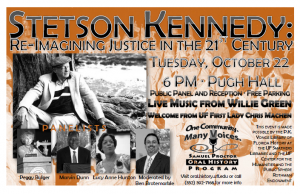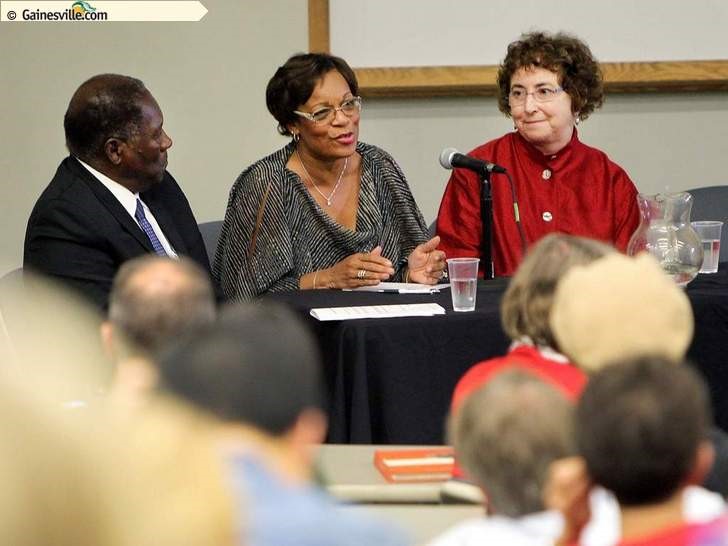October 22, 2013, “Stetson Kennedy: Re-Imagining Justice in the 21st Century”
By Emily Nyren, Intern Alumni and Volunteer
To celebrate the donation of Stetson Kennedy’s personal documents to the University of Florida, SPOHP hosted “Stetson Kennedy: Re-Imagining Justice in the 21st Century” on October 22.SPOHP’s program was one of many events at UF to celebrate the life and work of an incredible Florida folklorist, author, environmentalist, labor activist, and human rights advocate.
Considered one of the greatest pursuers of justice, Kennedy’s donation of letters, videos, cassette tapes, photographs, research files, and papers is a momentous occasion for UF and the state of Florida.
- In the News: “The Gainesville Sun, “UF to become home to Stetson Kennedy’s written legacy,” (opens in new tab) August 22, 2013
- MyGTN.tv “Stetson Kennedy Papers Donated to the University of Florida,”
- St.Augustine.com, “Ponte Vedra Beach: UF events honoring Stetson Kennedy,” (opens in new tab)
- The Gainesville Sun, “Coming Home At Last,” (opens in new tab) The Gainesville Sun, August 23, 2013
- Event News Release (opens in new tab)

Background: Stetson Kennedy’s Lifetime of Activism
Stetson Kennedy (1916-2011) fought against racism, oppression, and environmental degradation throughout his long life of 94 years. Known for infiltrating the Ku Klux Klan and publishing their secret signals, Kennedy was not afraid to take risks that could cost him his life. Dr. Jim Cusick, curator of the P.K. Yonge Library of Florida History, came up with the idea for the program and was one of the pivotal people behind organizing the vast Stetson Kennedy collection. The collection joins the work of Zora Neale Hurston and Marjorie Kinnan Rawlings at Special Collections in the George A. Smathers Library.
Blues musician Willie Green, a close friend of Kennedy’s, opened up the program in the packed auditorium. Green was recently selected to represent North Central Florida at the International Blues Competition (opens in new tab) in Memphis, Tennessee.
Another friend of Stetson Kennedy, Dr. Paul Ortiz, advised the audience to view Kennedy’s life as continuously important, not frozen in time. By doing so, he said, we can better see how far we have come and the strides that we still need to accomplish. Before introducing UF First Lady Chris Machen, Dr. Ortiz provided background on Kennedy’s storied life, and said that Stetson would have appreciated the program opening with “the voices of ordinary people” like Willie Green.
Chris Machen, wife of UF President Dr. Bernie Machen, served on the board of the Florida Folklife Council for six years and became fascinated with the cowboys known as Florida Crackers. Machen noted the importance of the Kennedy collection because it includes priceless material – accounts of lynchings and KKK activities collected for the Works Progress Administration’s “Florida: A Guide to the Southernmost State.”
Machen noted the humorous irony of Kennedy’s collection being placed in Smathers Library because Florida Senator George Smathers and Stetson Kennedy did not get along. Smathers opposed civil rights and Kennedy ran against him in the 1950 election. Citing a Willie Guthrie song titled “Stetson Kennedy” that describes the 1950 election, Machen concluded that Stetson will be the “loudest yeller” regardless of the library’s namesake.
Event Presentation: “Re-Imagining Justice in the 21st Century” with Dr. Marvin Dunn, Dr. Peggy Bulger, and Lucy Anne Hurston, moderated by Dr. Ben Brotemarkle
Dr. Ben Brotemarkle, Executive Director of the Florida Historical Society, served as moderator for the panel discussion. Dr. Brotemarkle holds a Ph.D. in Humanities with a specialization in Florida History and has written five books on the history and culture of Florida. Brotemarkle knew Kennedy during the last decade of his life and worked with him on a number of projects including Kennedy’s last book, The Florida Slave (2011). The three panelists included author and FIU professor Dr. Marvin Dunn, former director of the American Folklife Center at the Library of Congress Dr. Peggy Bulger, and Lucy Anne Hurston, author and niece of Zora Neale Hurston.
During the program, each panelist described Stetson Kennedy’s influence on their life and their academic pursuits. Dr. Peggy Bulger explained how she met Stetson Kennedy in the mid-1970s while she was doing research on Florida folklife. Kennedy’s decades of experience gave her historical grounding and they remained friends until Kennedy’s death. Kennedy interviewed workers in turpentine and sawmill camps who were treated as if they were slaves. Bulger said that Kennedy’s motive went above and beyond the academic sphere; he wanted to “make a change in peoples’ lives.”
Lucy Anne Hurston is an academic sociologist and teaches at Manchester Community College in Manchester, Connecticut. Answering Brotemarkle’s question concerning what this generation can learn from the work of Kennedy and Hurston, Lucy Anne Hurston told the audience, “we have an obligation to stand on the shoulders of giants.” Dr. Dunn said Stetson was instrumental in influencing him to “out evil.” Noting that racism still exists, Dunn urged the audience to rid themselves of guilt and anger over the past racial crimes of others.
Following questions from the audience, Sandra Parks closed the program with many individual thanks to those who knew and admired Stetson as well as those who carry on his mission.
Parks stated her hope that Stetson’s example will quicken our own interest in maintaining Florida’s fragile ecosystem and that Zora Neale Hurston and Peggy Bulger’s work on folklife makes us curious about our state heritage. Parks encouraged the audience to remember Kennedy in the 1940s, when he infiltrated the KKK, in thinking about how the human and civil rights of people today are being violated. Without a doubt, Stetson Kennedy showed what it is to live a life of purpose.
Sheila Payne, wife of Dr. Ortiz, once again provided the delicious reception food. The panelists offered book signings of their own books alongside a number of limited Stetson Kennedy autographed works.
Sponsors
The P.K. Yonge Library of Florida History at the Smathers Libraries, Civic Media Center, and the UF Center for the Humanities and the Public Sphere Rothman Endowment contributed to the event.
